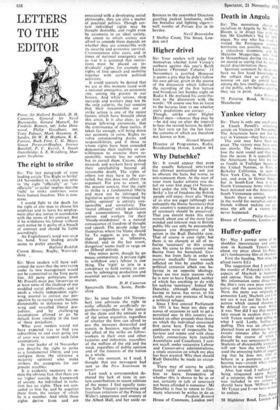LETTERS TO THE EDITOR
From: ,Sir Halford Reddish, D. H. Cameron, General Sir Nevil Brownjohn, Gerard Mansell, Sir Frederic Bennett, MP, John Dins- wood, Philip Goodhart, MP, Tony Palmer, Mark Haynton, R. Sondes, Dr W. B. Hepburn, R. K. Farrow, Ruth First, C. G. Mayo, Sinton Prestcott-Hughes, Jeremy Burchill, P. C. Keevil, I. Stuart Outerbridge, L. E. Weidberg, Mar- garet Stephens.
The right to strike Sir: The last paragraph of your leading article `The Right to Strike' (14 November) in which you refer to 'the right "officially" or "un- officially" to strike' implies that the 'right' to strike enshrines some basic human freedom. This is non- sense.
I would fight to the death for the right of any man to choose his employer and to leave his employ- ment after due notice in accordance with the terms of his contract. But if he withdraws his labour without such notice he is guilty of a breach of contract and should be liable accordingly. An Englishman's word was once his bond. Your leading article seems to prefer anarchy.
Halford Reddish Crown House, Rugby, Warwick- shire.
Sir: Most readers will have wel- comed the news that the SPECTATOR under its new management would not be committed to the Tory party line. All party politicians (even Mr Powell) must pay lip-service to at least some of the claptrap of our muddled social philosophy, and it needs a wholly independent right- wing journal to correct our per- spective by re-stating truths become disreputable in deference to left- wing and so-called liberal pre- judices; and by challenging assumptions allowed to go by default from timidity in the face of these prejudices.
What your readers would not have expected was to find you subscribing to and even going out of your way to support such false assumptions. In your leader of 14 November you describe the right to strike as a fundamental liberty. and you castigate those (by inference a majority opinion) who make strikers the scapegoats for our present troubles. It is evidently necessary to re- state the obvious fact. that there are no 'rights' outside the framework of society. An individual in isola- tion has no rights. They are con- ceded to him by, and he acquires them from. the society of which he is a member. And while these rights derive from and are associated with a developing social philosophy, they are also a matter of practical politics. Though cer- tain individual rights may be thought desirable, and might even be axiomatic in an ideal society, the extent to which society can afford to concede them depends on whether they are compatible with its security and economic survival. Circumstances alter cases, and in times of national emergency such as war it is accepted that restric- tions must be placed on in- dividuals' rights, for example the rights of free speech and mobility together with certain political activities.
It could scarcely be denied that we are at this moment faced with a national emergency, an economic one, among the gravest in our history. And while unions, shop stewards and workers may not be the only culprits, the fact remains that their irresponsible use of strike action is one of the major factors which have brought about this crisis. It is also clear, to all except left-wing extremists, that the continuance of these tactics, if taken far enough, will bring down our economy in ruins. Rights in- volve corresponding duties and responsibilities, and if those to whom rights have been conceded demonstrate their inability or un- willingness to exercise them re- sponsibly, society has no option but to curtail them. Unions, shop stewards and workers have proved their unreliability beyond all reasonable doubt. The rights of others too may have to be cur- tailed, but this does not affect the argument. For you to assert, in the present context, that the right to strike is a fundamental liberty and must not be infringed by legislative action or 'threatened by public opinion' is entirely irre- sponsible and unrealistic. The 'moral obloquy' which politicians and commentators heap upon unions and workers for their `bloody-mindedness' is a natural consequence of freedom of thought and speech. The people judge for themselves where the blame should lie. To suggest, as you do, that their judgment is 'offensive, illiberal. and in the last resort, dangerous' seems itself to verge on an illiberal attitude.
One minor point, though by no means unimportant. A private right to withdraw one's labour is one thing. The `right' to join in a conspiracy to hold society to ran- som by sabotaging production and essential services is quite another matter.
Sir: In your leader (14 Novem- ber) you advocate the right to strike officially or unofficially re- gardless—regardless of the justice of the claim and the attitude to it of the union executive, regardless of whether the firm can afford to pay the increases demanded and remain in •business. regardless of the effect of the strike on fellow- workers in their own and other_ factories and industries. regardless of the welfare of the old and the weak, regardless of public opinion and of the interests of the nation as a whole.
For one moment, as I read, I thought that our newsagent had sent us the New Statesman in error!
Last week a correspondent de- plored the lack of taste in cer- tain contributions to recent editions of the paper. I find equally taste- less Sally Vincent's patronising and facetious criticisms of the Prince of Wales's appearance and oratory at the Albert Hall, and her snide re-
D. H. Cameron
Spoutwells House, Scone, Perth- shire
ferences to the assembled Directors guzzling packed luncheons, swill- ing brandies and lighting cigars— well worthy of Private Eye in its heyday.
Nevil Brownjohn 5 Shelley Court, Tite Street, Lon- don sw3














































 Previous page
Previous page